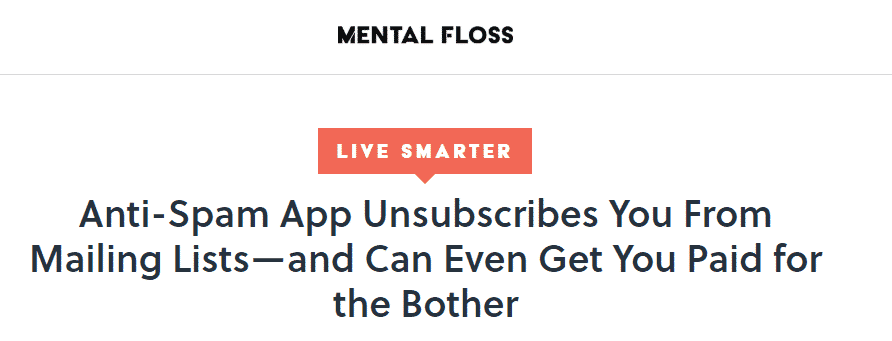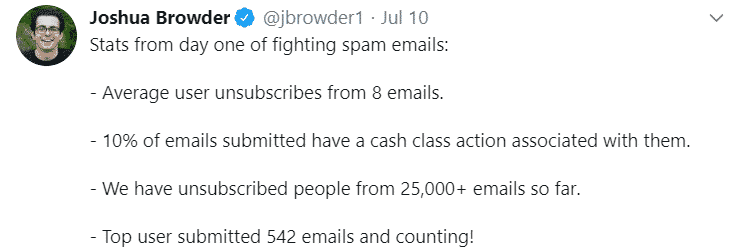How to Get Rid of Facebook Spam Email for Good
According to Statista, Facebook is still one of the most popular social networks in the world, with 1.69 billion users. Facebook has gained its popularity thanks to the innovative way of connecting people from all over the globe. As the years went by, Facebook also became infamous for sending a tremendous amount of spam emails. Users are getting tired and are looking for different ways to prevent Facebook from clogging their inbox.
How to Recognize if Facebook Emails Are Legit and Protect Yourself from Phishing
Do you know what phishing emails are? Scammers use phishing emails to trick people into giving them their personal data, such as passwords, credit card numbers or Social Security numbers.
Phishing emails may look like they came from Facebook, and if you don't take a closer look at the message you received, you may easily become a victim of an email scam. These emails usually look like:
- Notifications about your messages, photos, videos, events, and friend requests
- Claims that you went against Facebook Community Standards
- Alerts that something will happen with your account if you don't take a specific action, such as updating it
- Offers looking too good to be true, like winning a Facebook Lottery
What Else You Should Pay Attention To
Suppose you receive an email claiming your account was logged into from another location. It will not look odd because Facebook has a security option to notify if your account was logged into another location or computer. That said, the email might be from a cybercriminal posing as the social media platform.
To avoid being scammed, pay attention to the following details:
- Domain—Facebook uses Facebookmail.com to send notifications when it detects an attempt to log in to a user's account or change a password. If you received an email from a sender that doesn not have that domain, it is a scam.
- Facebook logo—Take a close look at the Facebook logo in the email you have received. Most likely, you will notice that it’s slightly different from the original.
- Personal Data—A real Facebook email warning you about your account's security problems includes your first name in the greeting, your profile picture (right next to the information), and your email address in the footer. In case you get an email that does not include these details, there's no doubt that it did not come from Facebook.
- Footer—Legitimate Facebook emails include a footer with your email address, an unsubscribe link, and Facebook's address in California. When footer is missing, that's undoubtedly another red flag.
- Spelling and grammar errors—A lot of typos and misspellings indicate that you are dealing with a scammer..
Facebook Will Not Ask You to Make a Phone Call
Facebook will never ask you to call it, no matter how serious the security issue with your account might be. If you receive an email asking you to call a number to resolve an issue regarding your account, make sure to google it, but whatever you find out, do not call the number.
Sometimes, instead of the phone number, a spam email may include a link. If you suspect the email you received is not from Facebook, don't click on it. Even if you are sure that you have received a real email, the safest way is to log into your Facebook account through your web browser or the mobile app.
How to Report Facebook Spam Email
Once you determine that the email you have received is illegitimate, you can report it to phish@facebook.com. If you are worried that your account has been compromised, try regaining access to it by visiting Facebook's hacked page.
How to Stop Receiving Spam Email From Facebook
Facebook is known for sending a lot of emails. Facebook users are used to receiving a lot of email notifications regarding their tagged pictures, friend requests, and likes their posts get.
If you want to get rid of spam emails from Facebook, one of the first things you can do is follow these steps:
- Open the Facebook website in any web browser
- Click the downward-pointing arrow, in the upper-right corner of the screen
- Select Settings
- Scroll down and select Notifications
- Scroll down until you find How You Get Notifications
- Click the downward-facing arrow to the right of the Email section
- Click the option you are interested in, under Email frequency
- By choosing the option Only about your account, you will ensure that all notification regarding your account, security, and privacy will be sent in an email
Keep in mind that Facebook uses a few email addresses to send email notifications, so make sure to unsubscribe from all of them.
|
How to Unsubscribe from Spam Emails From Facebook |
Yes/No |
|
Via the Facebook website | Yes |
| Via phone call |
No |
|
Using the unsubscribe option | Yes |
| Using DoNotPay |
Yes |
Get Rid of Facebook Spam Email With DoNotPay and Get Compensation

Getting rid of spam emails has become much easier and faster with DoNotPay. The world’s first AI Consumer Champion can help you unsubscribe from unwanted emails with a few clicks or taps on your mobile screen.
You can open DoNotPay in any . Here's what you need to do to stop receiving Facebook spam emails:
- Log into your DoNotPay account
- Select the Spam Collector Option
- Insert your email address to connect it with DoNotPay
- Forward any unwanted email to spam@donotpay.com
Once your email is delivered, we will unsubscribe you from the sender automatically. That's not all—if there's a class action suit against the sender, DoNotPay will send you a notification. You can join the lawsuit and even get compensation. In case the settlement is reached, you will see a flag in the Spam Collector tab on your DoNotPay dashboard.
Learn How to Deal With Different Spam-Related Issues

Aside from being quite irritating, spam emails can get you in a lot of trouble. Here's what you should know when you have to deal with spam email:
- How to unsubscribe from emails
- How to report spam email
- How to stop spam emails
- How to stop receiving emails
- How to block spam emails on Android
- The importance of reporting email abuse
DoNotPay Can Help You Get Rid of Physical Junk Mail Too

Are you getting tired useless newsletters and flyers cluttering your mailbox? We have a solution for you—DoNotPay can help you get rid of physical junk mail with minimum effort.
All you need to do is take a snapshot of the junk mail you receive and send it to us. The process is quite straightforward:
- Go to the DoNotPay homepage and choose the DoNotMail option
- Click on the Enroll Now button
- Upload a photo of the junk mail
Using the DoNotMail option, you not only save yourself from unnecessary waste and prevent any scam attempt, but you also help protect the environment. Here's the best part—if there's a class action suit against the sender, DoNotPay will send you a notification to join and even get compensation—up to 500 dollars!
DoNotPay Is Here to Help You With Different Issues
Aside from helping you fight spam emails, DoNotPay can give you a hand when dealing with different issues.
You can access DoNotPay from any . Whenever you need us, we are here to help you with:
- Dealing with credit cards issues
- Canceling subscriptions or memberships
- Signing up for free trials
- Disputing traffic tickets
- Getting in touch with customer service
- Fighting speeding tickets
- Contesting parking tickets
- Getting revenge on robocalls
- Getting compensation for delayed or canceled flights
- Suing companies and people in small claims court
- Scheduling a DMV appointment
- Dealing with bills you can't cover
- Protecting yourself from stalking and harassment
- Getting refunds from companies
- Getting rid of spam mail
 By
By